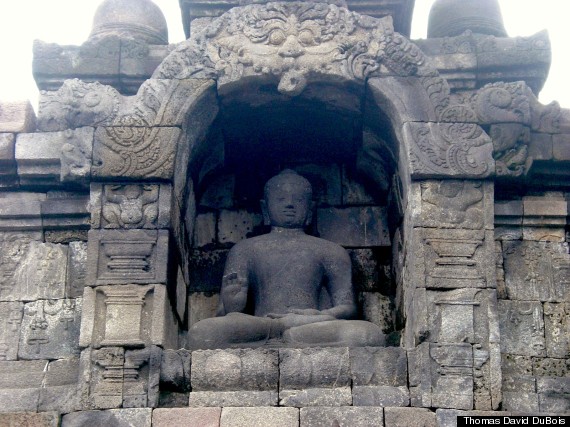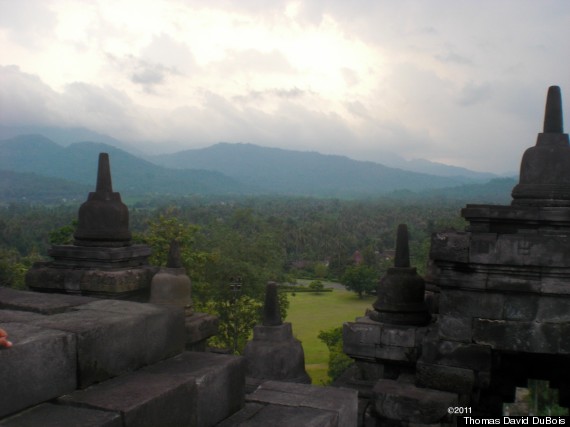
As religions go, Buddhism can be pretty hard to grab hold of.
Ask two Buddhists what they believe, and you won't just get two different answers -- you might get three or four. On the one hand, the sheer size and diversity of the Buddhist tradition makes it impossible to say what "Buddhists" think. Remember that Buddhism has been around for millennia, and has taken root in some very diverse cultures. Buddhism in Tibet, Japan and California can be about as different from each other as Judaism is from Islam. On the other hand, you also have the gulf between high and low traditions. Even within the same temple, the monks experience Buddhism very differently than the lay believer, and both are very different from the casual devotee who pops in now and then for a quick prayer.
Even beyond these differences, Buddhism is surprisingly slippery on some pretty important questions. Buddhism does not have a formal doctrine about the afterlife, or about karma. And there is no single consensus about whether the Buddha (who lived and died in Nepal about 2,500 years ago) was a divine figure or just a really smart guy. Although some individual schools might have strong opinions on this question, Buddhism as a whole does not.

But the deeper issue is that Buddhism just doesn't like to answer questions. For those who do not know, Buddhism is premised on the idea that life is an illusion. In its basic form, this teaching tells people not to make themselves miserable by trying to hold on to things they can never keep, like material possessions or health. More deeply, if Buddhism holds that the world around us is illusory and fleeting, it also has to ask what actually does exist. The answer is really a matter of perspective. We can watch fluffy clouds float through the sky and observe that their shape is impermanent, but we also know from science class that we will see these same clouds again in a different form -- as rainfall or drinking water, and eventually as more clouds. So the clouds do or do not exist, depending on how you think about it. Over the centuries, different schools of Buddhism have pondered these same questions about our own existence, and come up with variations on the same theme. We know that we don't exist in a permanent way, and yet you can go right now look in the mirror and -- there you are!
So do you actually exist or not? A Buddhist would say yes and no, but definitely not maybe. In a way, you do not exist any more than a cloud in the sky or a wave in the ocean. Yet, the same you will finish reading this blog, get up and walk around and maybe even interact with some other people. In practical terms, in order to live in this earth, you have to assume that you and the world you inhabit do exist. The two completely opposite truths are equally valid: the point is to reconcile the contradiction, and then find an even greater truth that transcends it. Buddhist thought loves to pose these dichotomies, because they represent walls that need to be torn down. We think we know the rules of the road -- that something is either true or false, yes or no, black or white. But like everything else that keeps us trapped, the logic that creates these walls in our minds are themselves illusions. This is why the Buddhist deity Avalokitesvara (known in China as Guanyin) is neither male nor female, but above the dichotomy between male and female.
And it is also why the Buddha both does and does not exist.

Does that make Buddhism agnostic? The word agnostic simply means "without knowing," and is a recognition that one does not have the capacity to answer a particular question. At one level, you could say that you are agnostic about whether a coin will land heads or tails. It cannot be known until it happens. At this level, we could ask whether a transcendental Buddha (or God, or what have you) exists, gather our facts and form an educated guess: yes, no or maybe.
But the Buddhist approach to theological unknowables isn't simply a matter of finding data. A better example of Buddhist agnosticism come from the wilder edge of theoretical physics, ideas such as the Higgs boson, the Big Bang, or the existence of multiple universes. I can accept the explanation of why other universes might exist, but only with the caveat that it is impossible for humans to begin to wrap their heads around the very idea of another universe that is not a physical place, and where the basic laws of Newtonian physics would not apply. The question itself is beyond our ability to even understand, much less answer (except maybe with a Keanu Reeves-style whooooa!)
As always, I welcome comments on this blog, and will respond to specific questions on my personal webpage.